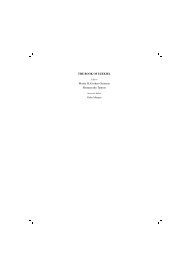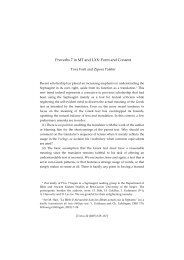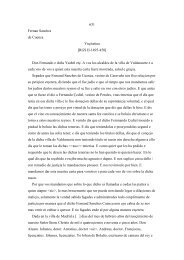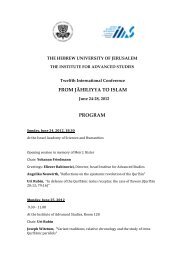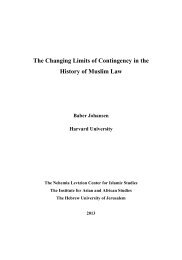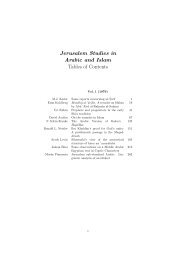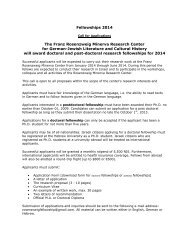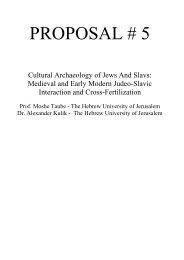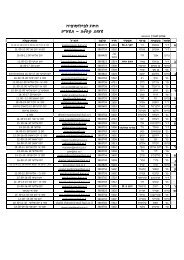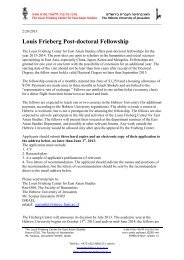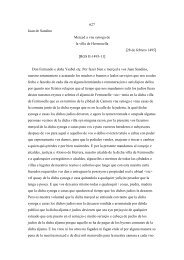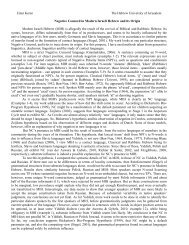Twentieth-Century Russian Literature. Selected Papers from the ...
Twentieth-Century Russian Literature. Selected Papers from the ...
Twentieth-Century Russian Literature. Selected Papers from the ...
Create successful ePaper yourself
Turn your PDF publications into a flip-book with our unique Google optimized e-Paper software.
24<br />
6 Pasternak does not say explicitly that, after her departure <strong>from</strong> Varykino, Lara was married to Komarovsky.<br />
However, <strong>the</strong> author clearly wished <strong>the</strong> reader to believe that "Raisa Komarova was <strong>the</strong> wife of comrade Komarov".<br />
This conclusion can be made on <strong>the</strong> basis of <strong>the</strong> story told by Lara's daughter Tania (XVI,4:495). Comparing Tania's<br />
story with what Komarovsky himself told Lara of his prospects for <strong>the</strong> future (XIV,1:409 and XIV,11:433), one can<br />
see that <strong>the</strong> two stories have many details in common: a minister in Far East (White Mongolia), a special train, a<br />
flight <strong>from</strong> <strong>the</strong> Reds.<br />
7 See note 5 *.<br />
8 On <strong>the</strong> realization of metaphors in Doctor Zhivago see Willem Weststeijn 'Metaphor and Simile in Doktor<br />
Zhivago, Essays in Poetics X, 2 (1985) 41–57.<br />
9 On Lara's association with water see Livingstone, op. cit., p. 67. Notably, after Yurii's death, Lara redirects this<br />
metaphore to him: she likens him to a "swift, deep river", and "<strong>the</strong> cold waves" of <strong>the</strong> sea (485).<br />
10. This was first noted by Henry Gifford Pasternak: A Critical Study. [Cambridge: Cambridge University Press,<br />
1977] p. 194)<br />
11. The author ends Lara's biography with <strong>the</strong> possibility that she may still be alive. But if alive, she is out of life,<br />
placed in one of <strong>the</strong> countless nor<strong>the</strong>rn camps, stripped of her name, and given a number instead. The number is<br />
included in a list, which is lost. The passage is notable for <strong>the</strong> abundance of lexical uncertainties: "umerla ili propala<br />
neizvestno gde, zabytaia pod kakim-nibud' bezymyannym nomerom iz vposledstvii zapropastivshikhsya spiskov v<br />
odnom iz neischislimykh obshchikh ili zhenskikh kontslagerei severa" (XV,17:486).<br />
12. One could justify <strong>the</strong> affinity of Lara and Evgraf by <strong>the</strong>ir outlandish natures. They both are exotic, and not only<br />
due to <strong>the</strong> remoteness of <strong>the</strong>ir birthplaces, <strong>the</strong> Urals and Siberia. This is more obvious in <strong>the</strong> case of Evgraf, who is<br />
mysterious and Asiatic-looking. He is also 'black' (XVI,3:494); Evgraf's name and his Siberian home are first<br />
mentioned on <strong>the</strong> same page where <strong>the</strong> legendary Ural muzhiks are described, and a phonetic parallel between his<br />
name and <strong>the</strong> names of <strong>the</strong> muzhiks can hardly be overlooked. The name is 'ringing and bulging' (zvuchnoe i<br />
vypukloe) resembling by its three-consonant cluster <strong>the</strong> neighboring names of Favst, Vakkh and Avkt. (For an<br />
extensive interpretation of <strong>the</strong> Evgraf–Vakkh connections see Jerzy Faryno, 'Knyaginya Stolbunova-Enritsi i ee syn<br />
Evgraf /Arkheopoetika Doktora Zhivago, 1/; in: Anna Majmieskulow (ed) Pasternak's Poetiks, (Studia Filologiczne,<br />
Zeszyt 31 /12/), Bydgoszcz 1990, pp. 155–221; especially 174-175). As for Lara, her foreignness is not forced upon<br />
<strong>the</strong> reader: this is hardly needed, since <strong>the</strong> foreign lands and cities are found in her soul (358).<br />
13. Resurrection is one of most important problems set in <strong>the</strong> novel. Part XVI ends with <strong>the</strong> hope and expectation of<br />
unattainable 'freedom and light'; this makes a bridge to Yurii's book of poetry, in Part XVII. In <strong>the</strong> poems,<br />
resurrection is placed into a powerful context of universal redemption. Yurii Zhivago is given ano<strong>the</strong>r chance to pass<br />
through his life, under <strong>the</strong> protection of Hamlet, Christ, and Pasternak himself. Cf. Per Arne Bodin Nine Poems<br />
<strong>from</strong> Doktor Zhivago: A Study of Christian Motifs in Boris Pasternak's Poetry. (Stockholm: Almqvist and Wiksell,<br />
1976).<br />
14. I am drawing here on <strong>the</strong> distinction between <strong>the</strong> events and motives as different textual units suggested in my<br />
earlier papers: see M. Langleben, 'The grades of reading', in M-E. Conte, J.S. Petöfi, E. Sözer (eds), Text and<br />
Discourse Connectedness (Amsterdam: J. Benjamins, 1989), pp. 441-461.; specifically on <strong>the</strong> iterational motives see<br />
M. Langleben, D. Langleben, 'Iterational structures in anomalous texts', in: B. Wårwik, S.-K. Tanskanen, R.<br />
Hiltunen (eds), Organization in Discourse: Proceedings <strong>from</strong> <strong>the</strong> Turku Conference (Turku: U. of Turku, 1995) pp.<br />
329-340.<br />
15. Besides <strong>the</strong>se three shots, <strong>the</strong>re is plenty of additional shooting in <strong>the</strong> novel. Taking account of all instances of<br />
all <strong>the</strong> instances of shooting, Elliott Mossman finds in Doctor Zhivago a deeper plot based on <strong>the</strong> evolution of <strong>the</strong><br />
predicate 'shoot', in which Lara's shot takes a determining position. ('Linguistic Fictions: The Grammar of <strong>the</strong> Plot in<br />
Doctor Zhivago (manuscript), 1990.)<br />
16. To assess <strong>the</strong> relation of <strong>the</strong> plot and <strong>the</strong> LC, in Doctor Zhivago, a distinction between two types of reading can<br />
be helpful. Linear scanning builds up <strong>the</strong> surface of text, but brings little understanding; non-linear digesting<br />
interconnects <strong>the</strong> elements of <strong>the</strong> text into a meaningful whole. See Maria Langleben 'Bakhtin's Notions of Time and<br />
Textanalysis', <strong>Russian</strong> <strong>Literature</strong> XXVI(1989), 167–90.



